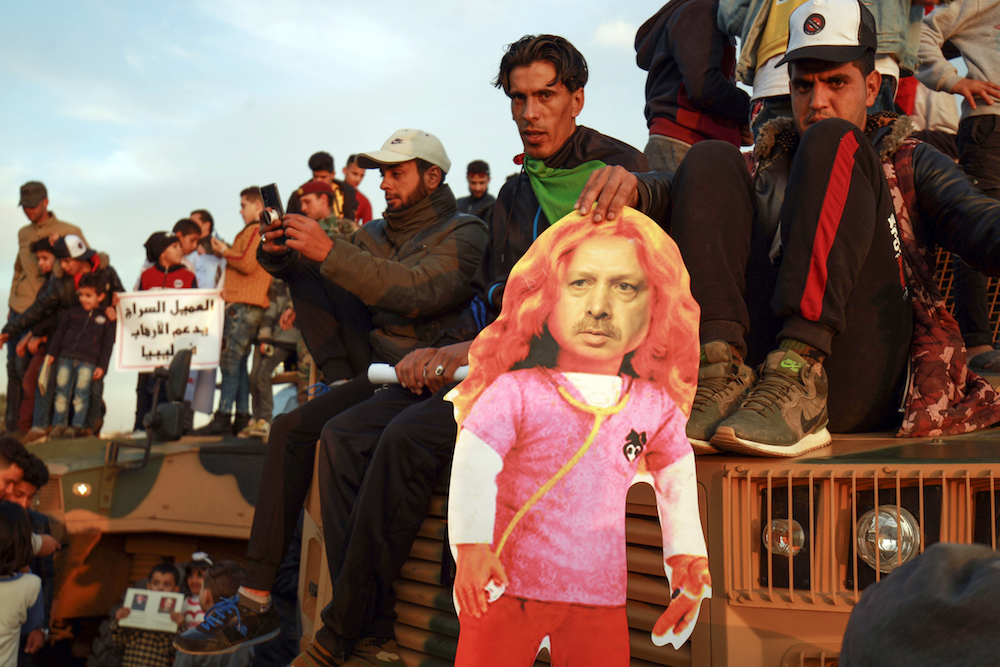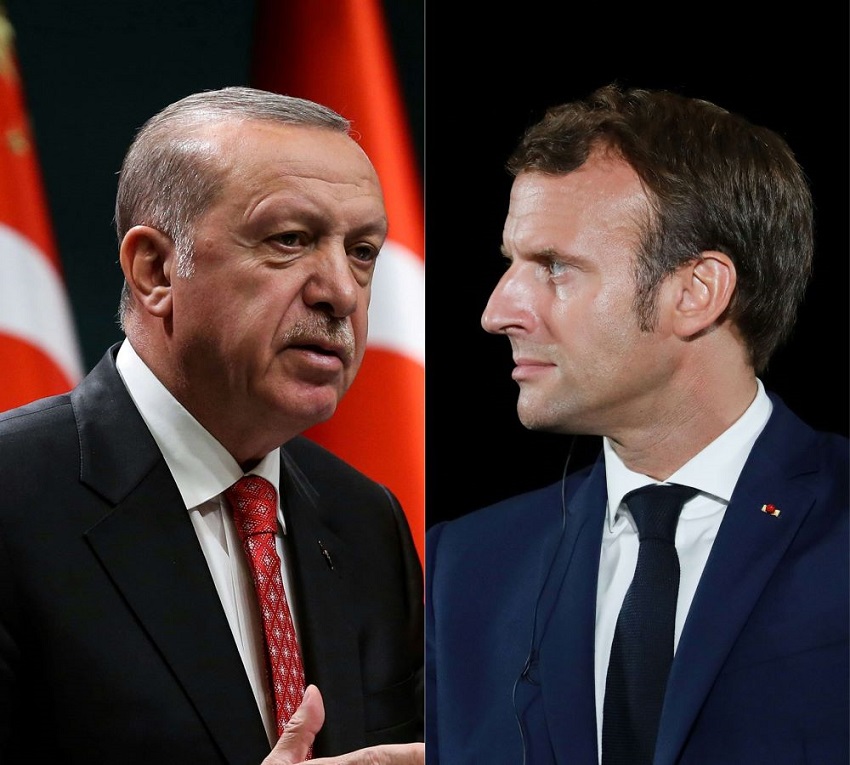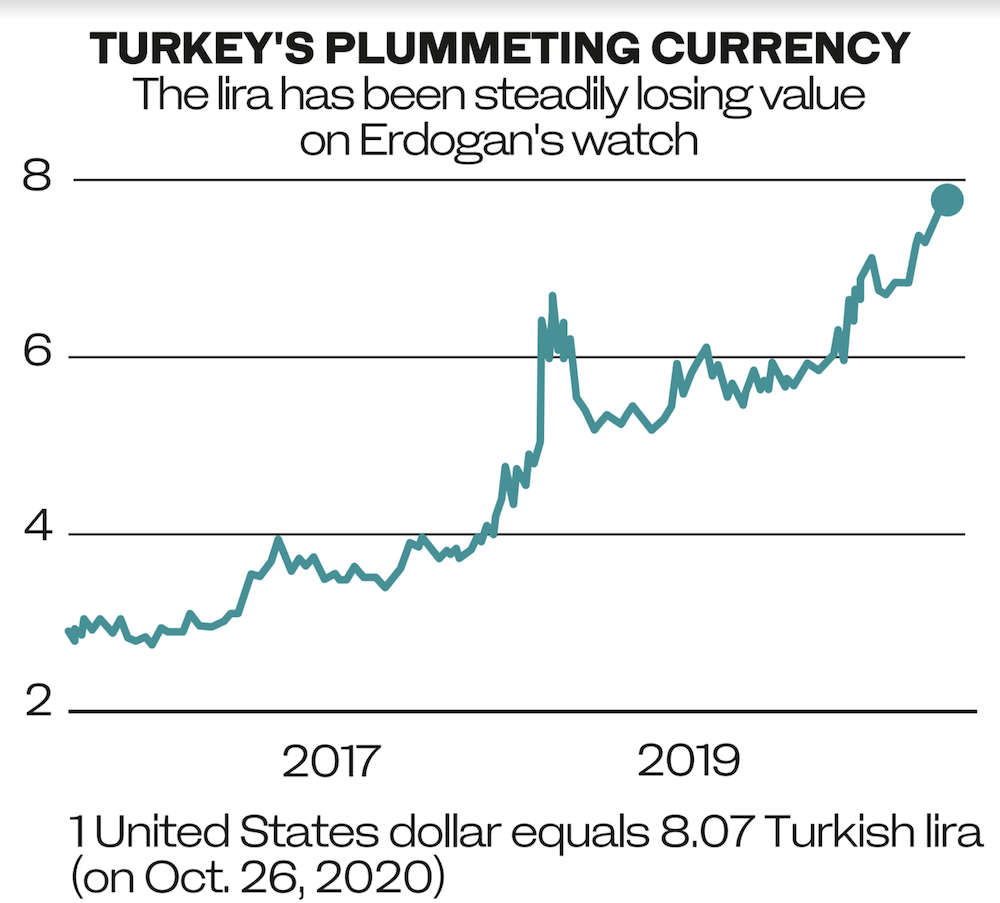MISSOURI: The Turkish lira plumbed new depths on Monday, breaching the psychological barrier of 8 to the US dollar, after President Recep Tayyip Erdogan challenged the US to slap more sanctions on his country and ratcheted up the rhetoric against European leaders.
Barely 10 years ago, Turkey’s foreign relations and role in the Mediterranean and Middle East looked very different from today’s mess. With the economy growing at an impressive rate, an increasingly confident Turkey with a popular and stable government at home had begun to play a leadership role in the region.
Then, Foreign Minister Ahmet Davutoglu was touting his “zero problems with neighbors” foreign policy, first announced in 2008. The policy saw Turkey improve its relations with every neighboring state, with Ankara becoming a mediator of choice in conflicts from Afghanistan and Pakistan to intra-Palestinian disputes, Israeli talks with Syria and even American-Iran tensions.
European and North American statesmen regularly sang President Erdogan’s praises, and US President Obama even held Turkey forth as a “model” Muslim democracy and ally. At the same time, Turkish businesses pursued ever expanding projects throughout a welcoming Arab world, in Asia and in sub-Saharan Africa.
Visa requirements with Syria were lifted, with talk of similar openings to other Arab states. Even relations between Ankara and the Kurdistan Regional Government of Iraq flourished during this period, with reciprocal state visits that saw the Kurdistan Region’s flag flying alongside the Turkish one. At home, Ankara likewise pursued peace talks with political representatives of Turkey’s own Kurdish population.
Today, the situation could not look more different. In just 10 short years, Turkey has gone from “zero problems with neighbors” to almost “zero friendly neighbors.”
Naval drills in the Mediterranean see French, Greek, Cypriot and even Israeli and Egyptian vessels in tense standoffs with Turkish ones. Peace talks with the Kurds were replaced with a resumption of hostilities and Ankara’s relations with Iraqi Kurds too became more frosty.

A currency exchange office worker works at an exchange office in Istanbul, on August 6, 2020 as Turkey's lira set a new record low against the US dollar. (AFP/File Photo)
Several Arab states have begun boycotting Turkish goods, while France and some other European states push for EU sanctions on Ankara.
The US Congress and Senate likewise agitate for sanctions on Turkey while various think tanks in Washington discuss the desirability of Turkey remaining a part of NATO. This year Israeli leaders, for the first time, added Turkey to their annual threat assessments, so bad have their relations become.
Even some voices in Moscow openly speculate about whether or not President Erdogan harbors “Ottoman ambitions.” Not a week seems to go by without some dramatic war of words between Erdogan and leaders in Europe, the US, or the Arab world. Over just the last couple of weeks, Turkey’s disputes with others and destabilizing activities make for an impressive list, in fact.
By many accounts, Turkey recently increased its arms exports to Azerbaijan and then goaded Baku into resuming its war with Armenia — which caused alarm especially in Moscow (a major backer of Armenia).
Ankara played a spoiler role in Libya as well, effectively scuttling a ceasefire agreement between rival governments there. In the Mediterranean, Turkey continued ignoring the maritime claims of Greece and Cyprus to explore for gas in a huge swatch of coastal waters it claims for itself.

Supporters of Khalika Haftar carry an effigy of Turkish President Recep Tayyip Erdogan wearing a wig and colourful clothing as they take part in a demonstration in the coastal city of Benghazi in eastern Libya, against Turkish intervention in the country's affairs on February 14, 2020. (AFP/File Photo)
In Iraq, Turkey continued bombing various rural communities near the border where Kurdish militants are active, simultaneously increasing its number of military bases and soldiers in the country — against Baghdad’s wishes.
In Syria, Turkey continues to occupy large swathes of the north — where it displaced hundreds of thousands of Kurdish civilians when it invaded Afrin in 2018 and Jazira in 2019 — and Erdogan during the past week even began threatening a third operation into other areas of the country with a significant Kurdish population.
In these areas and in the mostly Arab Idlib province, Ankara also continues to back and deploy Islamist proxy forces — some of them former Daesh fighters and quite radical.
Turkey even sent its Syrian proxy mercenaries to Libya and Azerbaijan as well to help push its interests in those conflicts. Turkish support for Muslim Brotherhood-aligned groups across the Middle East and North Africa thus continues unabated, effectively ruining Ankara’s relations with Egypt, Saudi Arabia, the UAE and other states in the area who oppose political Islam.

Azeri protesters wearing face paint shout slogans and wave Azerbaijan national flags as they take part in a demonstration in Istanbul on October 4, 2020, in support of Azerbaijan in the conflict between Azerbaijan and Armenia over Nagorno-Karabakh.
Turkey’s use of religion as a political tool to rally support worldwide has again flared up in its relations with France. After President Emmanuel Macron announced measures in France to prevent the political misuse of Islam there (following the beheading of a French teacher near Paris by a radicalized French-Chechen Muslim), Turkish President Erdogan lashed out at the French measures and accused Macron of needing “mental treatment.”
In normal times, the French moves to monitor foreign income sources of Muslim groups in France and the training of imams there should have elicited little comment abroad. Erdogan, however, immediately moved to spark another dispute over the issue, in order to cast himself as “defender of Islam” like the Caliphs of the bygone Ottoman Empire.
Qatar and Iran joined Turkey in condemning France. Government-controlled media in Turkey even ran stories about how Palestinian Islamic Jihad (a small and normally insignificant Iranian proxy group on all the Western terrorist group lists) “paid tribute to the Turkish Republic for defending Islam and Muslims.”

Turkish President Recep Tayyip Erdogan, left, and his French counterpart Emmanuel Macron. (AFP)
Going back further than a couple of weeks, one could cite a long list of Turkish disputes from the last 10 years with just about everyone save Iran, Qatar, Azerbaijan and a few non-state actors.
The list could include but not be limited to Erdogan’s threats to deliver an “Ottoman slap” to the Americans, Turkish efforts to help Iran evade sanctions, calling today’s leaders in Europe “Nazis”, claiming that various Islands in the Aegean should be under Turkish rather than Greek sovereignty, threatening to use refugees as a weapon to flood Europe, various anti-Semitic dog whistle statements about “the interest rate lobby” and “a greater mind” seeking to destroy Turkey, and a host of other confrontations.
So how did Turkey go from “zero problems with neighbors” to this? On the one hand, some increased tensions should be expected as a country grows in power and flexes its muscles.
China, for instance, has increasingly serious disputes about maritime borders and exclusive coastal water issues. China is not involved in half as many armed conflicts or vociferous diplomatic disputes as Turkey entered in just the last few years, however, and Turkey’s vaunted economic growth stagnated almost around the same time its “zero problems with neighbors” policy did.

Indeed, the economic problems and political and military disputes may go hand in hand. Several factors came together in the last ten years to bring Turkey to where it is now.
First, Erdogan’s government pushed the Turkish military back to the barracks, allowing him to change the country’s foreign policy orientation and approach to Islam as he saw fit. When the Arab Spring uprisings broke out in 2011, Erdogan viewed it as an opportunity to support Muslim Brotherhood-aligned groups across the Arab region.
When Turkey’s economy started slowing down and opposition to his government mounted at home, however, Erdogan doubled down on his support for Islamists abroad — casting himself as a “defender of Islam” to distract people from the worsening economy and his own increasing authoritarianism. Every war of words with Europeans, Americans, Armenians, Israelis and other non-Muslims helps Erdogan do this.
The war with the Kurds, which he chose to resume after a particularly weak electoral showing in 2015, similarly helped distract his domestic political opponents.
The problem for Turkey is that increasing entanglements abroad and confrontations with others will exacerbate its economic problems. In a short amount of time, Turkey may find itself very much over-extended and isolated. At some point after that happens, the Turkish public will either blame Erdogan for what happened or Turkey will see itself become a much weaker pariah state, or both.
* David Romano is Thomas G. Strong Professor of Middle East Politics at Missouri State University













